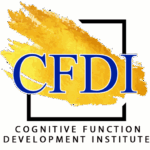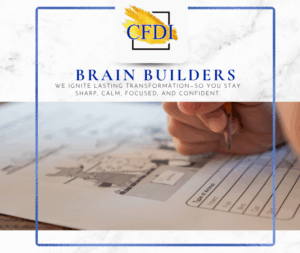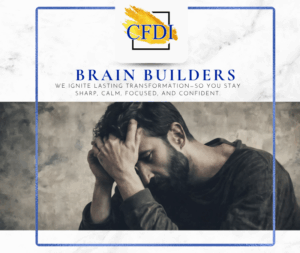Cognitive Decline & Aging Brain Health
Preserve independence and cognitive vitality.
CFDT activates the same neuroplastic mechanisms that support learning at any age — keeping the mind agile and connected.
For older adults, this can mean stronger memory, better attention, and renewed mental energy. For those in early cognitive decline, CFDT provides a proactive way to slow loss, rebuild function, and sustain quality of life.
Clients often describe not only thinking more clearly, but also feeling emotionally brighter and more engaged with loved ones.
Benefits and Applications of CFDT for Emotional Balance:
Activates neuroplasticity with CFDT for agile learning
Enhances memory, attention, and mental energy in older adults.
Slows cognitive decline and rebuilds function proactively.
Boosts emotional brightness and engagement with loved ones.
Request an Assessment
Cognitive Function Development Assessment
The assessment results and a consultation review with a healthcare professional.

Your brain is not static—it’s rhythmic, adaptive, and capable of profound change.
By guiding it back into harmony with its natural oscillations, you’re supporting the biological foundation of resilience, clarity, and connection.
Strengthen the Brain. Balance the System. Expand Functional Capacity.
At CFDI – BrainBuilders.Health, we use Cognitive Function Development Therapy (CFDT) — a neuroscience-based modality designed to tune the brain’s functional systems like an orchestra.
Restores cognitive harmony for improved focus and adaptability.
Supports clinical populations with safe, non-invasive therapy.
Enhances learning and performance without medication.
Promotes emotional balance for grounded, confident living.
Benefits individuals aged 6 to 96+ with tailored interventions.
Cognitive Health Services
By integrating emotional regulation with cognitive development, we help clients move from struggle to strength — building calm, clarity, and confidence that extends into every area of life.
ADHD & Executive Function Challenges
Build focus, structure, and calm.
CFDT helps individuals with ADHD and executive function challenges improve the brain’s ability to shift, sustain, and organize attention.
Anxiety, Depression & PTSD
Restore emotional balance — without re traumatization.
Anxiety, depression, and trauma often reflect a nervous system stuck in survival mode. CFDT helps rebalance these systems by guiding the brain toward safety, stability, and connection.
Neurological Disorders & Brain Injury Recovery
Support recovery and rebuild connection.
After a concussion, stroke, or other neurological disruption, communication between brain systems often weakens.
Higher-Functioning Autism Spectrum Disorders
Strengthen communication, regulation, and cognitive flexibility.
For verbal, engaged individuals on the autism spectrum, CFDT supports the brain’s ability to process information, regulate emotion, and connect socially.
Cognitive Decline & Aging Brain Health
Preserve independence and cognitive vitality.
CFDT activates the same neuroplastic mechanisms that support learning at any age — keeping the mind agile and connected.
Academic & Test-Taking Challenges
Strengthen focus, memory, and confidence.
For children and teens who struggle to organize, study, or test well, CFDT helps develop the underlying systems that make learning possible.
Career & Cognitive Performance
Enhance clarity, adaptability, and decision-making.
Professionals seeking an edge in focus, creativity, or productivity benefit from CFDT’s ability to fine-tune executive functions.
Sports & Peak Performance
Train the brain to perform under pressure.
Elite performance depends on neural precision. CFDT sharpens reaction time, focus, and recovery by helping the brain and nervous system synchronize under stress.
Everyday Brain Optimization
Feel sharper, calmer, and more connected.
Even without a diagnosis, stress, digital overload, and modern pace can dysregulate the nervous system. CFDT helps restore balance — improving focus, mood, energy, and sleep.
Not Sure Where You Fit?
CFDT meets you where you are — whether you’re recovering, rebuilding, or optimizing.
Brain Builders: Strengthening Your Cognitive Core
Empower Your Mind with CFDT’s Neuroscience-Based Approach
Explore how Cognitive Function Development Therapy (CFDT) strengthens primary cognitive functions—attention, working memory, and encoded memory—to unlock better focus, emotional resilience, and life success. Our blog shares practical insights to build a stronger brain for kids and adults alike.



